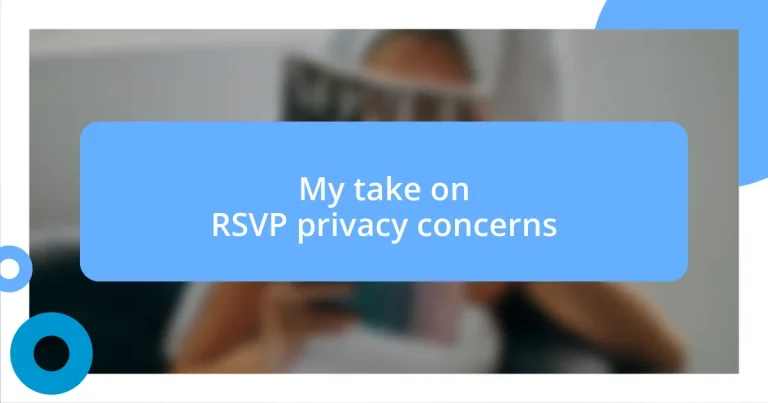Key takeaways:
- RSVP privacy is essential to protect personal information, maintain event intimacy, and prevent unwanted guests.
- Common concerns include data collection, guest list exposure, and platform security, highlighting the need for careful consideration of RSVP tools.
- Best practices for safeguarding RSVP data include using secure platforms, limiting shared information, and understanding legal compliance with privacy laws like GDPR and CCPA.
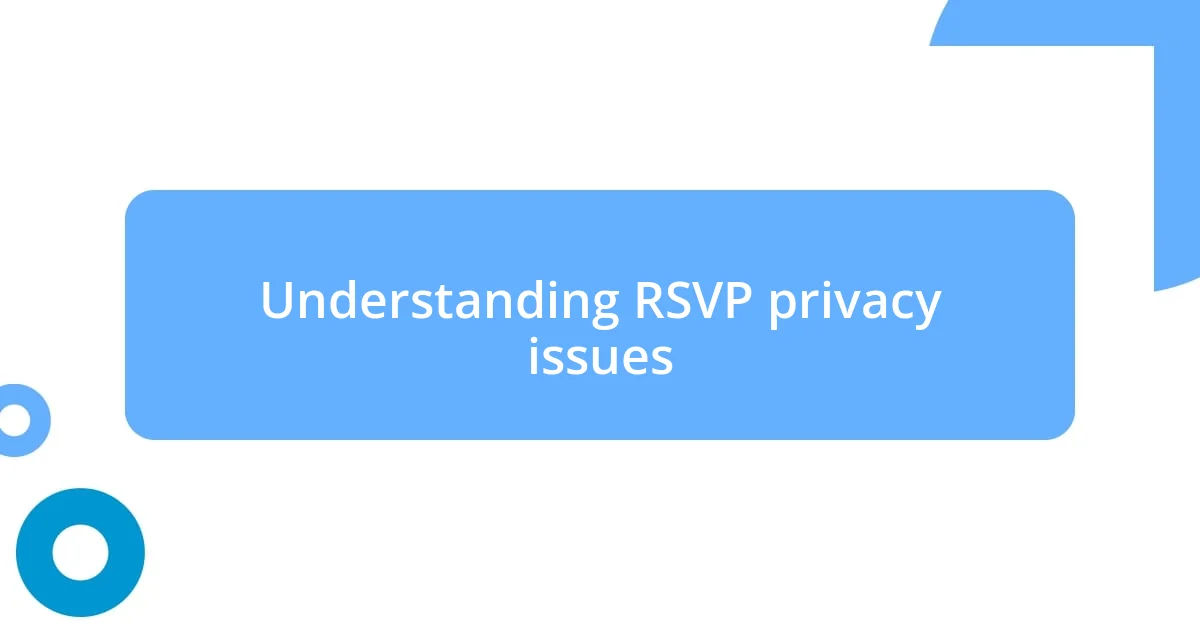
Understanding RSVP privacy issues
When it comes to RSVP privacy issues, the stakes can feel surprisingly high. I remember planning a birthday party and asking guests for their dietary preferences through an online form. It struck me how easy it was to inadvertently share information I didn’t intend for others to see. Have you ever considered who might access those responses?
I’ve also heard stories from friends whose events turned into a public spectacle because of oversharing. One friend hosted a small gathering, but the guest list was accidentally shared on social media. Suddenly, what was meant to be an intimate event was flooded with uninvited guests. It really made me think: how much do we truly control our private events in an age where online platforms dominate our invitations and responses?
Furthermore, there’s always that underlying anxiety about how our information might be utilized. Just the other day, I stumbled upon a discussion about data mining—where personal details can be extracted from seemingly innocent RSVP forms. It dawned on me that what starts as an easy way to organize gatherings can transform into a privacy nightmare if we’re not vigilant. How often do we pause to question the platforms we use?
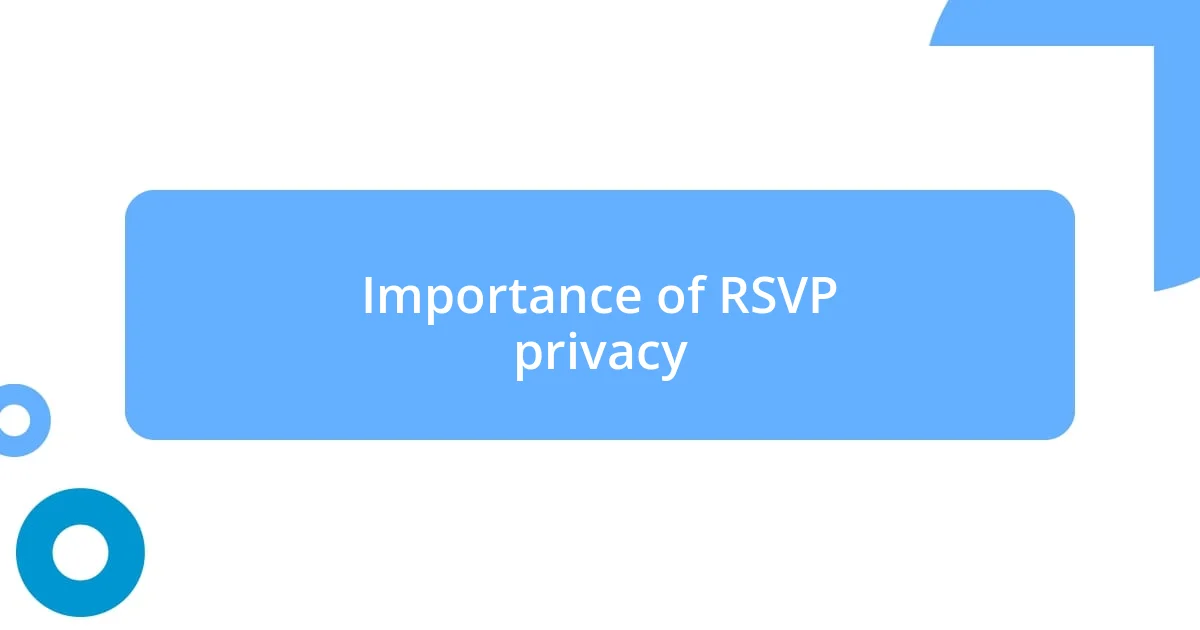
Importance of RSVP privacy
The importance of RSVP privacy cannot be overstated. In my own experience, I once received an invite to a colleague’s wedding, only to discover later that the guest list was publicly visible online. It felt like a breach of trust—what if someone I didn’t want to see found out I was going? This moment highlighted for me just how fragile our privacy can be when we rely on digital RSVP tools.
- Protecting personal information from potential misuse.
- Maintaining the intimacy of social gatherings.
- Preventing unwanted guests and surprises.
- Ensuring a sense of security for hosts and invitees alike.
Ultimately, embracing RSVP privacy means recognizing that every detail we share can have repercussions. I often think back to a surprise party I organized for a close friend. I was meticulous about who I shared details with, ensuring only the closest confidants were in the loop. The joy on her face when she walked in to a room full of friends was priceless. That experience reinforced my belief that safeguarding RSVP privacy is essential for preserving special moments that we create with our loved ones.
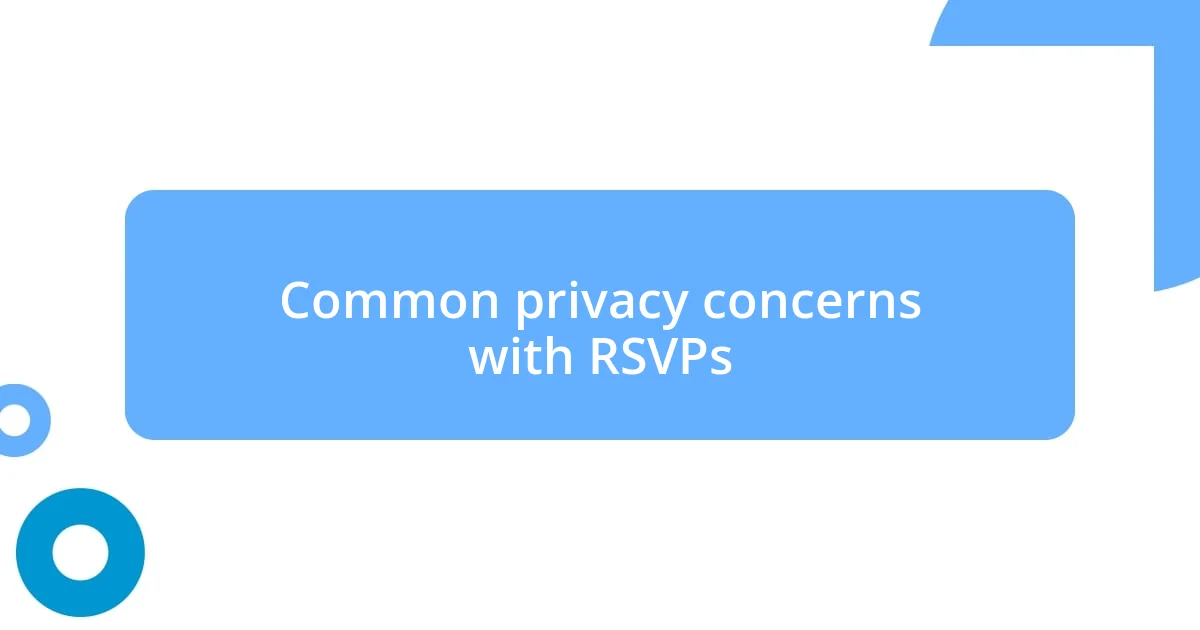
Common privacy concerns with RSVPs
When diving into common privacy concerns with RSVPs, the unease surrounding data collection stands out to me. I once signed up for an event, thinking it was harmless, but later found out that my details were archived for marketing purposes. At that moment, I realized how easily our information can straddle the line between innocent engagement and intrusive tracking. Have you ever wondered where your RSVP information really ends up?
Another notable concern is the potential for unintended exposure of guest lists. I remember attending a wedding where the guest list mistakenly included someone I hadn’t seen in years. It sparked a mix of excitement and anxiety—would they bring up old memories? Balancing the joy of connection and the discomfort of unexpected reunions prompted thoughts about how careful we need to be with whom we share those lists. Transparency in RSVP management is crucial for maintaining our comfort levels at gatherings.
Lastly, there’s the broader issue of data safety within RSVP platforms. I recently learned of a friend whose virtual event fell victim to a data breach, exposing personal details of attendees. This event deeply unsettled me, making it clear that online tools must prioritize user security. How often do we ask ourselves if the convenience is worth potentially compromising our privacy? The crux of the matter is, our RSVP interactions demand careful consideration of the tools we use to ensure our information remains safeguarded.
| Privacy Concern | Personal Insight |
|---|---|
| Data Collection | Harmless signing up can lead to misuse of our information. |
| Guest List Exposure | Unexpected reunions can create discomfort at events. |
| Data Safety | Online tools must protect us from potential breaches. |
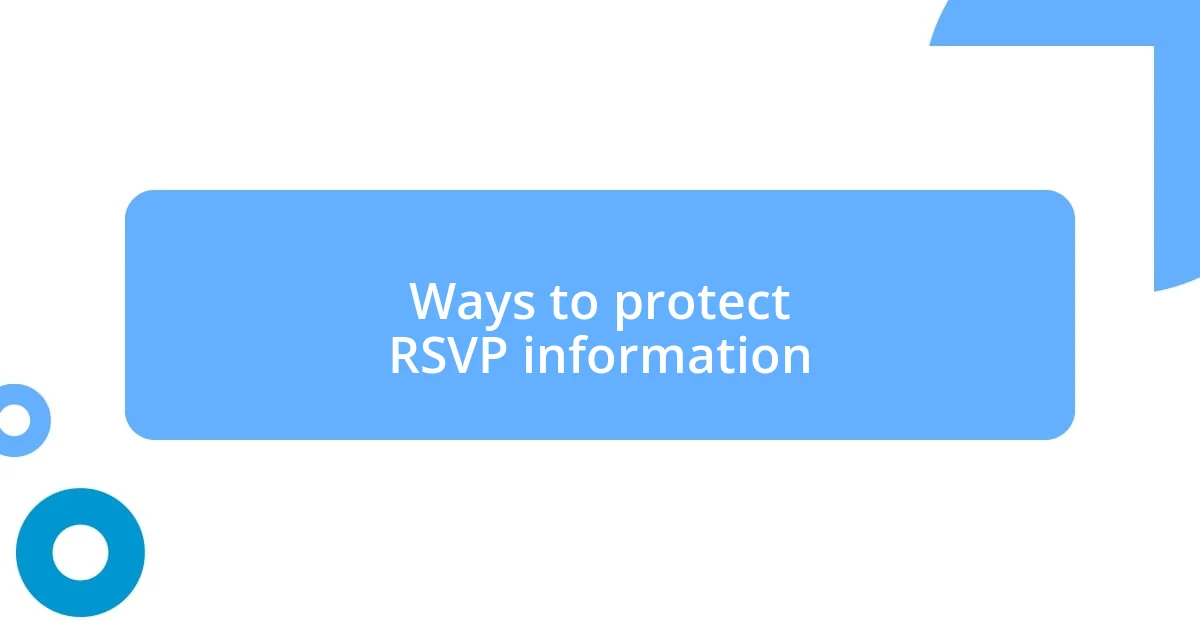
Ways to protect RSVP information
When it comes to protecting RSVP information, one of the most effective methods is to use secure platforms that prioritize user privacy. I remember when I was planning a small gathering and stumbled upon an event tool that promised enhanced security. It gave me such peace of mind knowing that my guest list wouldn’t just be floating around in cyberspace, vulnerable to anyone searching online. Have you evaluated the tools you’re using for such events? I highly recommend doing your homework!
Another strategy revolves around limiting the information you share. During my experience with organizing a birthday party, I decided only to collect essential details—no extra personal notes or comments. This not only simplified my planning process but also shielded my invitees from unnecessary data exposure. How many event details do you really need to share? Less can indeed be more when it comes to privacy.
Lastly, consider utilizing private settings when sending out invites. Once, I used a social media event feature that allowed me to invite guests in a closed group. This created a sense of intimacy and trust, knowing that only invited guests could see the details. It was such a relief to have that layer of protection in place. Have you tried creating exclusive event spaces? They can make a world of difference in maintaining the confidentiality of your RSVP information.
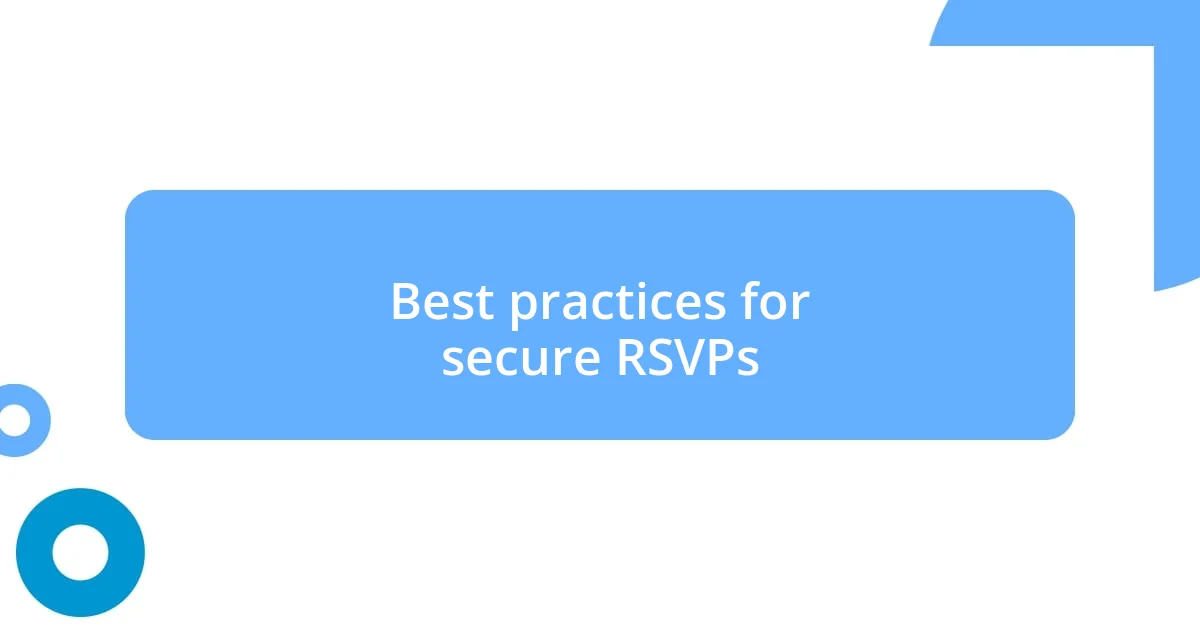
Best practices for secure RSVPs
In my journey of organizing events, I found that using unique RSVP links for each guest can be a game changer. I recall a time when I created personalized links for a family reunion invitation. Not only did it feel special for each attendee, but it also kept track of responses securely without exposing anyone’s information. Have you ever considered how adding that small detail can elevate the sense of privacy for your guests?
Another best practice I advocate for is setting clear expectations regarding data usage. Once, while hosting a casual dinner party, I included a brief note in the invitation explaining how I would handle personal information. It fostered trust among my guests and reassured them that their details wouldn’t be shared with any third parties. Doesn’t it feel good to know that people are on the same page?”
Lastly, I recommend regularly reviewing the privacy settings of your chosen RSVP platform. I had a rather eye-opening experience when I discovered that my go-to RSVP site had updated its policies without notifying users. It prompted me to switch to a platform with stricter data protection measures. How well do you know the privacy features of the tools you use? Staying informed can protect you and your invitees from potential privacy pitfalls.
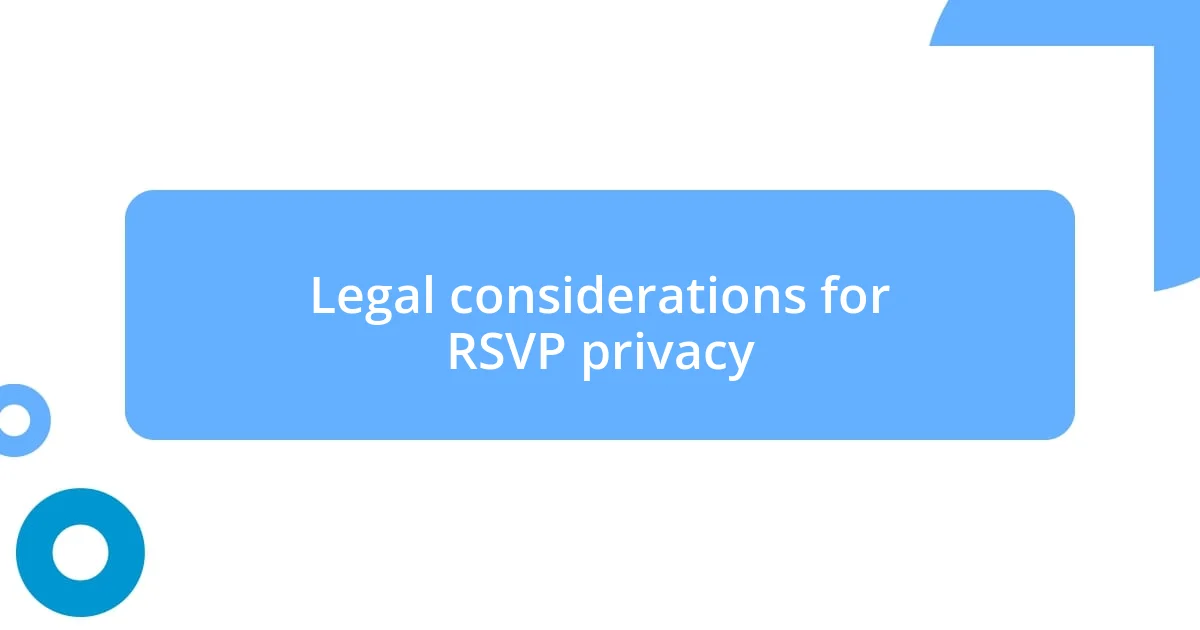
Legal considerations for RSVP privacy
Understanding the legal landscape surrounding RSVP privacy is crucial for anyone organizing events. I recall once hosting a workshop, where I felt uneasy about sharing attendees’ information with a venue that didn’t have a robust privacy policy. It made me realize that the legal obligations vary by location and type of event, emphasizing the importance of conducting thorough research before sharing personal data. Do you know what privacy laws apply in your area?
When I looked into the regulations, I found that adherence to laws like GDPR in Europe and CCPA in California is non-negotiable for event planners. This legislation often requires that organizers obtain explicit consent from guests before collecting their information. I distinctly remember drafting a consent statement for my guest list, which felt like an important step in respecting their privacy. Have you considered how your practices align with these legal requirements?
Furthermore, I learned that failing to comply with data privacy laws could lead to significant fines. That realization hit home during a conversation with a fellow organizer who faced backlash after a guest’s data was mishandled. I didn’t want to land in a similar situation, so I ensured to implement clear guidelines about data handling from day one. What measures are you taking to protect yourself from potential legal issues?












